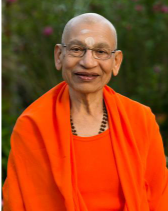
Spirituality

By Swami Viditātmānand Saraswati*
Freedom from the dependence of viṣaya (worldly objects) for happiness
Vedānta Darśana tells us that before bringing about any changes anywhere, we should try to understand our own mind. While thinking about what it is that disturbs my mind, it is realized that the reason for disturbance or conflict in the mind is the dissatisfaction with the self only. Honeybee sits on a flower with the hope of honey. Similarly, our mind follows the viṣayas of the world in the hope of satisfaction. If that mind gets satisfaction from its own ātmā, it will automatically stop going out. As though, from our experience, we see that we get happiness when we get something we like or meet someone we like that we are interested in. And, we get satisfaction from that happiness. I wanted to have ice cream for a long time. When that desire was fulfilled, I felt happy. We had planned to ride on a ropeway for a long time. This year for vacation, we went to Joṣīmaṭha. There, we sat on the longest ropeway and got the satisfaction of fulfilling that desire. In this way, we understand that when we get what we desire, we feel satisfied and until we get it, there is dissatisfaction in the mind.
Also, I have my own such experience as though there is no happiness or satisfaction within myself. I only have unhappiness and dissatisfaction within me. Therefore, I feel good when I get something I like from the outside and if I do not get anything from the outside, my mind remains unhappy and sad. śabda sparśa rūpa rasagandha are all the viṣayas of īndriyas (senses). Wife, son, friends, literature, music, art, etc. are the viṣayas for the mind. Gaining new knowledge, and creating something new, are the viṣayas for the intellect and power, prestige, respect etc. are the viṣayas of ahaṅkāra. In addition, the experience of satisfying the sexual instinct is also there. All these experiences come under the category of viṣayas. We feel happy when we get any of these viṣayas. However, in the context of sthitaprajña (wise person), Bhagavāna says that ātmanyevātmanā tuṣṭaḥ, a wise person is content within himself by himself. This means he is free from the need for external objects for happiness or satisfaction. He does not need any external viṣayas or objects. He is free from all the expectations. He is independent.
Real independence or real freedom means freedom from dependence on viṣayas for happiness. Manusmruti says that dependence on others is unhappiness and self-reliance is happiness, sarvaṁ paravaśaṁ duḥkhaṁ sarvamātmavaśaṁ sukham. We are under the control of the viṣayas of the world. We are dependent on the world; we are slaves of the world; the world manages us. I am not able to decide whether I will be happy or not, the world decides that. When someone presses a certain button of mine, I become unhappy and when someone else presses another button, I become happy. In this manner, when my likes and dislikes are satisfied, I become happy and when they do not get satisfied, I become unhappy. If tea is ruined, the morning is ruined! If dāḻa is ruined, the day is ruined! If pickles are ruined, the year is ruined! If the wife is ruined, life is ruined! Our morning mood is decided by tea. Whether our day improves or gets ruined is determined by dāḻa. The year is decided by the pickle. How dependent we are! To rely on something for happiness is called dependence. Where there is dependence, there is always unhappiness. Even when it seems happiness from the outside, there is unhappiness. I become happy if I get to eat ice cream; this shows that I am dependent on ice cream for happiness.
A wise person is free from such dependence. We also need to be free like that. What is the difference between us and the wise? Is his ātmā of some special kind which is the reason for satisfaction? And is our ātmā different which can be the reason for dissatisfaction? No, that is not the case. Everyone has the same, one ātmā. The ātmā of wise is also the ātmā of you, me and everyone else. Therefore, if the wise person has satisfaction because of the ātmā, the self, we all should also get satisfied because of the ātmā only.
Then, why are we not satisfied by ātmā, the self?
Because a wise person has the knowledge of santoṣa (satisfaction) as svarūpa of ātmā. Bhagavāna does not say that a wise person grows wings or walks above the earth because he has achieved liberation. In the description of a wise person, there is no mention of his bodily sign or any external characteristics because knowledge does not have any relation with the external situation. Knowledge is related to antaḥkaraṇa. ātmanyevātmanā tuṣṭaḥ, these words show that satisfaction and joy are the svarūpa of ātmā . Even when this is the case, the man constantly keeps wandering in the viṣayas, and it shows that he does not have the knowledge of his real nature, santoṣa svarūpa.
Dissatisfaction is because of ignorance.
But, how can that happen? I am a human being and I know that I am a human being. I have two hands, two legs, and one head and I know all that. Then, why don’t I know that I am ānanda. Why is it so that although I am ānanda, I feel unhappy; and, although I am content, I feel dissatisfied?
The reason for that is ignorance. Only ignorance creates a distance between me and myself. In this regard, there is a story about the 10th man in Vedanta. Once upon a time, ten boys started on a tour. There was a river on the way. The river was shallow so all the boys started walking in the river to go across. However, on the way, the water was a bit deeper in one location. Therefore, the younger boys had to swim in the water. But finally, all of them reached the other side of the river. Once they reached there, they thought of verifying if all of them reached safely or not. Therefore, one older boy had the rest of the boys stand in a line and started counting. One, two, three, four, five, six, seven, eight and nine. The tenth boy was not in the line. Therefore, only nine boys were counted. Everyone started worrying about what if the tenth boy had been swept away in the water. Then another boy tried counting, the third one counted and finally, they confirmed that the tenth boy had vanished, and had been swept away in the water. Now they all started looking for the tenth boy. They kept looking at the river and in the surrounding area for the whole day. The mood of the trip faded away and they all started crying by the evening.
– to continue
*Swami Viditatmananda Saraswati has been teaching Vedānta Prasthānatrayī and Prakaraṇagranthas for the last 40 years in Ahmedabad, Gujarat. Throughout the year, he conducts daily Vedānta discourses, accompanied by retreats, and Jñāna Yajñas on Vedānta in different cities in India and in foreign countries.





